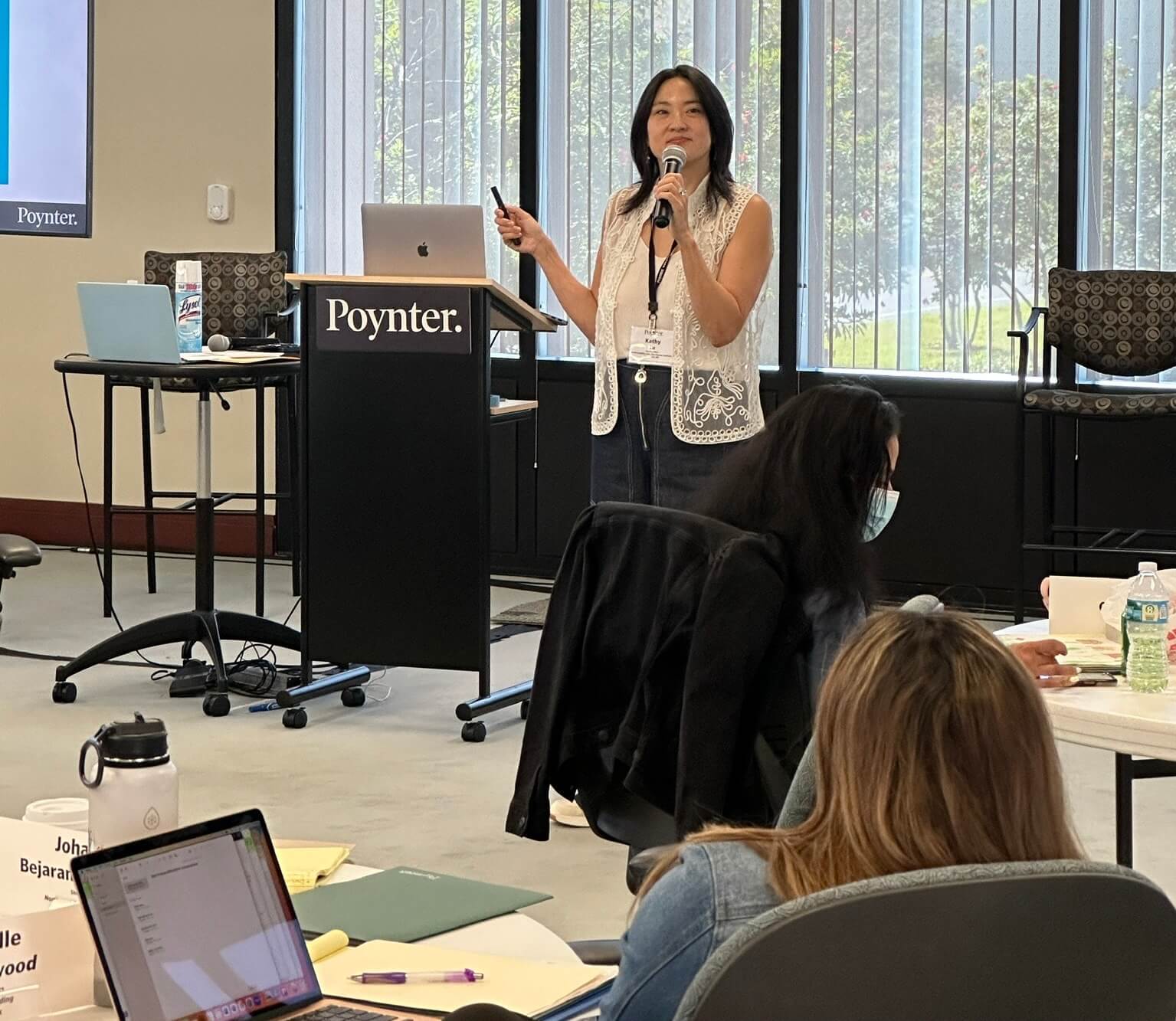Washington Post researcher Julie Tate is among the winners of this year’s Eugene Meyer Awards at the Washington Post, Post Publisher Katharine Weymouth tells staffers in an email. Tate “began her career at The Post occupying a seat in the very back of the newsroom — in “the library” — where the job was usually to locate newspaper clips and spell-check names for reporters writing stories,” Weymouth writes.
But Julie had her own ideas about research, and they went far beyond what most reporters knew to ask for. They included original reporting that made links between events and people, people and addresses, people and people, and eventually secret things the government was trying to hide. For those reporters who spotted her unique skills, she was a gold mine. They would scheme to get her to work with them because they knew she would find facts and relationships they hadn’t even thought of.
Tate, Weymouth writes, has “shared more Pulitzer Prizes than anyone in the newsroom; in 2005 alone her name was on four of the six won by The Washington Post that year.”
In 2008, Erik Wemple, then the editor of Washington City Paper (where I worked with him), wrote about Tate, calling her an “Unsung Hero” on pieces like Dana Priest and Anne Hull’s series on Walter Reed Hospital. Tate was previously a fact-checker at The New Yorker and gave a seminar there in fact-checking techniques after its senior editor Peter Canby heard her talk “about search programs she was using that I had never heard of,” he told Wemple.
The other Meyer Award winners for 2013 are Mark Gross and John Mallory. Weymouth’s full memo follows celebratory tweets about Tate:
https://twitter.com/Max_Fisher/status/405076625940676609
Best researcher in journalism? Also a former NYer checker RT @ErikWemple: From the archives, a piece on @Julieatate: http://t.co/XkjDoFUI6T
— Craig Silverman (@CraigSilverman) November 25, 2013
Congrats to @JulieATate for being recognized for her great work.
— emptywheel (not a bill) (@emptywheel) November 25, 2013
Working in a town overflowing with massive overstatement, @JulieATate might be the most valuable journalist you don't know. She's the best.
— Derek Willis (@derekwillis) November 25, 2013
And a vintage tweet about Tate:
"Julie Tate contributed to this report" are surely among the most underrated words in journalism.
— Blake Hounshell (@blakehounshell) August 29, 2013
Weymouth’s memo:
Please join me to celebrate our 2013 winners, Mark Gross in the Advertising Department, Julie Tate in News andJohn Mallory in Circulation. You can read a little bit about them below and will hear more at the ceremony. This year, we will also honor Don Graham, our fearless leader and our inspiration for the past three decades.
The event is on Wednesday, December 11 from 5:30 – 10:00 in the auditorium. Come celebrate your peers!
MARK GROSS: After starting his career selling radio advertising, Mark joined The Post in 1988 in the home furnishings group and within his first year was promoted to manage the fashion advertising team. Over the next 10 years, Mark added management responsibility across the retail business. From early on, Mark exhibited great pride in the brand he represented. He also viewed helping his clients and colleagues to be part of his responsibility. Mark was and has always been, an ambassador for The Washington Post.
A fateful decision some fifteen years ago sent Mark pioneering to the West Coast to establish a Washington Post outpost in San Francisco, a place from which The Washington Post brand has emanated ever since. He was there to help us capitalize on the tech boom as a technology category sales rep and in his first year generated $600,000 in revenue. That territory now consistently drives over $10 million annually. He’s cracked business for the Post with big accounts from Microsoft and HP to Google and Apple. Of course, Mark saw his role not just as the technology sales rep but as the voice of The Post in Northern California and made sure his relationships were more expansive, regularly engaging with people from other key accounts not currently on his list at that time, like Gap and Safeway.
From the media buyer’s to the CEO’s office, Mark is endlessly engaged with his customers.
As The Post prepares for our next chapter, Mark’s ability to constantly adapt and serve as a brand ambassador are models from which we can all draw inspiration.
JOHN MALLORY: John Mallory began his association with The Washington Post as a home delivery agent in Northern Virginia in 1986.
He was hired as a zone manager in Southern Virginia on June 8, 1987. As was common at the time, John was transferred to another area shortly after joining The Post. Almost a year later, John assumed the role of home delivery Zone manager in Prince George’s County. He moved back to Virginia as a home delivery zone Manager in December 1991 and has remained there since. John currently manages the Virginia 1 Zone which includes Alexandria, Lorton, Woodbridge, Fauquier County running out to the Luray and Front Royal areas. The areas he has managed have changed and grown tremendously as our business has changed over the years. John has helped to lead the department through numerous changes including zip code realignment, centralizing customer records and billing, micro zoning and alternate product delivery.
John has been incredibly adept at working through all of our changes and making sure that our customers get the best possible service.
John is the senior zone manager and is considered by many to be the elder statesman of the department. John has twice been named the Zone Manager of the Year and has been nominated several other times. John is a great example of the best of the best.
JULIE TATE: Julie began her career at The Post occupying a seat in the very back of the newsroom — in “the library” — where the job was usually to locate newspaper clips and spell-check names for reporters writing stories. But Julie had her own ideas about research, and they went far beyond what most reporters knew to ask for. They included original reporting that made links between events and people, people and addresses, people and people, and eventually secret things the government was trying to hide. For those reporters who spotted her unique skills, she was a gold mine. They would scheme to get her to work with them because they knew she would find facts and relationships they hadn’t even thought of.
Julie’s interests and knowledge, it turned out, were vast. It wasn’t just that she could hold the name of every Al Qaeda terrorist and Guantanamo prisoner in her head, organized by date of capture or killing, but she could unearth every person who ever worked for Dick Cheney, she had instant recall of football and basketball players on a dozen teams. On deadline she is as competitive as any seasoned reporter and second to none in mining social media, digging up the self-published biographies and rants of crazy people who do crazy things—and piecing together the lives of their unfortunate victims. Columbine. Virginia Tech. Aurora. Sandy Spring. The Navy Yard. Her signature contributions to understanding our national tragedies have been to allow those murdered to speak, and for the killers to be less a mystery than they would have been without her work.
Her tradecraft is sophisticated and her curiosity endless.
She has shared more Pulitzer Prizes than anyone in the newsroom; in 2005 alone her name was on four of the six won by The Washington Post that year.
In recent years, her name as moved from the bottom to the top of stories she has reported and written.
For her dedication to detail and to original reporting, for her unassuming and collegial personality, for her gift at finding the unfindable, and for her unwavering sense of responsibility for getting the facts right, she is receiving this award.
See you there!
Katharine






Comments